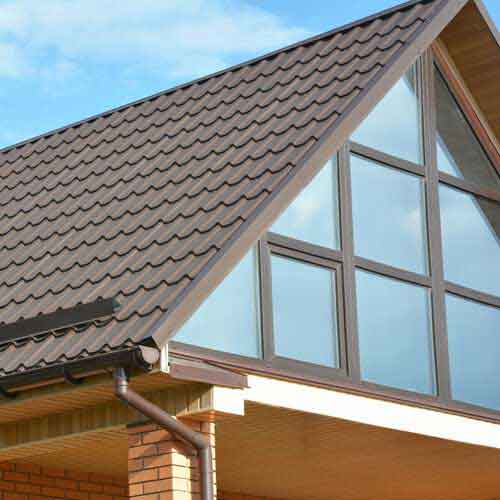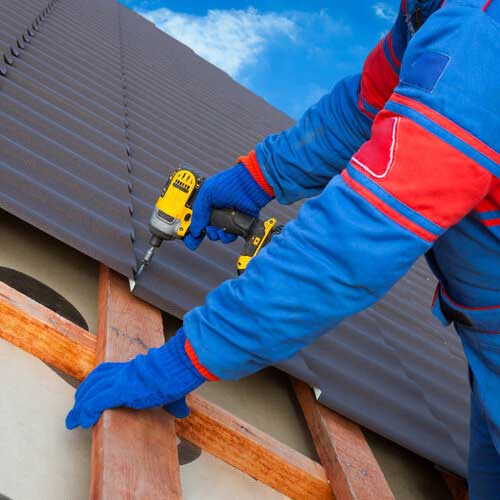Why are metal roofs better?
Homeowners and insurance companies are tired of roof damages and insurance claims. It’s not a win for either side, and for the homeowner, it can be a major disruption to the household while roof repairs are done, or a new roof installed. This has led many homeowners to consider a metal roof for their home and insurance companies are loving it!

A metal roof is referred to as a forever roof, thus making it a better roofing choice for homes. A few reasons why are:
- Durable, Long-Lasting: Asphalt shingle roofing is the more common and traditional choice for homeowners. However, we are all noticing a metal roof has proven to have more durability, giving it a longer lifespan. In fact, a lifespan that extends for 60 years or more when coated or more than 100 years if it is a copper or zinc metal roof. A metal roof can withstand hail, ice, rain, snow, and UV rays longer than an asphalt roof.
- Fungus, Moss Proof: Unlike asphalt, a metal roof is 100% resistant to fungus, mildew, mold, and moss.
- Critter, Insect Proof: Where critters, insects, and rodents can get through an asphalt roof, they can’t with a metal roof!
- Fire Resistant: A metal roof is fire-retardant with most high-end metal roofs rated Class A fire retardancy. If your home is in an area that is a wildfire prone zone, your insurance company will love a metal roof, even enough to give you some discount for that upgrade, as much as 35% with some companies.
- Sustainability: A metal roof is a sustainable material, lasting up to three times longer than an asphalt roof. This means it won’t need replacing as often and when it does need replace, metal is recyclable. The metal used on a metal roof is 30% recycled material too!
- Withstands Hail: Most metal roofs are rated with a class-4 hail impact-rating against hail-stones up to a 2 inch diameter. Some metal roof manufacturers offer a warranty to their hail impact rating.
What are the disadvantages of a metal roof?
Even with these advantages and benefits, a metal roof has one big disadvantage: the cost of installing the metal roof. The upfront cost is a lot more than an asphalt roof, but once it is installed, with proper maintenance and upkeep, you won’t be replacing it again in 20-25 years.
Do metal roofs make houses hotter?
Nope, that is a myth and probably because metal roofing is misunderstood, or not well understood at all. A resin coated metal roof coated can achieve solar reflectance index over 70 compared to the solar reflectance index of 25 for asphalt cool roofs. Because it reflects most of the solar radiance, it helps keep the surface cooler and limits how much heat is absorbed and transferred inside your home.
An additional point here is the thermal emissivity that a metal roof offers. The day’s solar radiant heat is released into the atmosphere quickly with the sunsetting. A metal roof will cool down faster than an asphalt roof.
What is the best metal roof for a house?
Based on the aspects of a metal roof for a residential structure, the best metal would be any of the following:
- Aluminum
- Copper
- Galvalume
- Stainless steel
Before choosing a metal for your roof, you need to consider the following factors:
- Your budget
- The climate where you live
- The weight of the metal roof on your structure
- Sustainability and recyclability
- Maintenance
- Metal material availability
What is the best material for a metal roof?
When it comes to metal roofing, there is a wide range of metal that is used. From different materials, metal roofs are created, like aluminum copper, stainless steel, steel, and zinc alloy. Each of these differs in appearance, durability, price, and more. The two most common and recommended materials for a residential metal roof are steel and aluminum. This is because:
- Steel: A heavier and sturdier metal than aluminum, best for areas that are hail prone.
- Aluminum: Lightweight and soft, best for coastal areas because it doesn’t rust.
What gauge metal roofing is best for houses?
With metal, the smaller the number, the heavier the metal gauge. So a 26 gauge corrugated metal roof would be a light gauge and less expensive choice. A 24 gauge in standing seam metal roof installation would be the better choice for heartier and heavier metal.
What is the best color of metal roof for energy savings?
The color of a metal roof is a definite influence on the energy use in your home, so you want to choose a color that will contribute to its money-saving aspects each month. As with clothing, lighter colors will reflect the UV rays and the heat they create, while dark colors absorb and hold the heat. Depending on the climate where your home is situated, choose a light or dark shade for your metal roof installation.
Can I put a metal roof over shingles?
In most cases yes, a metal roof can be installed over your existing shingle roof. This will save you money because the roof doesn’t have to do a tear-off of old roofing material. However, the roofing contractor will perform an inspection of your current roofing and the structure. If they find that installing a metal roof over the existing one isn’t safe or could void the manufacturer warranty on the metal, they may advise you differently. For more information on metal roofs, call us today at (512) 299-6576.

Last Question To Close Out – Does a metal roof lower your insurance?
When you take a homeowner’s insurance policy out, the insurer will inspect your home. Factors they consider are the roof age and type of material, along with what it will cost to replace the roof as well as the entire house. Roofing materials that can get you up to 35% cheaper rates are concrete shingles, slate, tile, and metal roof materials.
